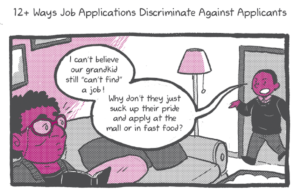I’ve been trying to write this article for weeks.
Every time I think about writing it, I’m frozen. And the more time that elapses, the harder it is for me to get started.
In fact, just the act of opening up my word processor took about as much energy as I imagine it takes to lift a car above your head, move a pile of bricks with your mind, or make a billion dollars over night.
And this doesn’t just apply to this one article. Most of the time, this inability to act expands to everyday tasks. Cleaning the dishes, making the bed – hell, getting out of bed can be just as difficult.
This is nothing new in my life.
Throughout my academic career, I’d constantly leave things at school that needed to be brought home, forget that certain assignments were due, and would leave everything to the last minute.
This was so bad that almost every night, my mother would have to drive me back to school just to pick up all of the things I had left in my desk.
Many folks see this behavior and are quick to label it laziness.
However, this process wasn’t a way to escape my responsibilities or shirk off school work, but the result of a brain incapable of the necessary planning and self-motivation it took to get things done in a timely fashion.
For the first 22 years of my life, I listened to teachers and peers complain about my lack of focus, laziness, and inability to plan things out. I was known for my apathy and most people in my life thought that I was “winging it” constantly because I just didn’t care.
It was incredibly frustrating because, on one hand, I started to believe people when they told me I was just apathetic and lazy, but, on the other, I knew that there was more going on than just laziness and apathy.
When there’s no other word for your inability to do things the way others do, you begin to believe the other words that are thrown your way. There was no way for my friends, peers, and teachers to know that every day was a struggle against my brain.
I also couldn’t convince myself, let alone others, that I simply couldn’t light the fire under my ass that seemed to be required for me to do things the way others demanded I do them.
When I asked myself – or when others asked me – why I couldn’t just do what I needed to do when I needed to do it, the only response I could think of was “I just can’t.” And that just didn’t seem like a valid answer.
But then I ran into a term that radically changed the way I viewed myself: executive dysfunction.
Executive dysfunction is a term for neurological differences that effect planning, flexibility, organization, and self-monitoring, and it can appear in folks with anxiety, autism, and OCD (of which, I have all three).
And although many folks who experience executive dysfunction internalize this idea of “laziness,” assuming that someone doesn’t want to do something instead of acknowledging that some folks cannot do the same amount of stuff that you do (in the way that you do it) is ableist.
And this line of thinking that I had internalized is oppressive – not only to me, but to other disabled folks.
Now, as a disabled adult, I’ve found it hard to uncover many helpful sources about executive dysfunction. It seems to only be talked about within school settings. And this makes sense, considering that school is a place where planning, organization, and self-monitoring are key to normative success.
But the Internet (and all executive dysfunction articles) seems to have forgotten that adults also experience executive dysfunction.
And if you’re one of them, you know all to well that this is not something that begins and ends in a classroom setting.
So, lets break this down. What exactly does executive dysfunction affect?
1. Planning and Time Management
Say you have a big research paper due.
The first thing your teacher usually tells you is “Don’t wait until the night before to do this.”
And that makes sense – because things like research papers require an immense amount of planning. You have to think of a topic, break that topic down into bite sized pieces, go grab some books on that subject, pick out the useful bits, write an outline, fill it all in with actual paper substance, and create a works cited page – all in only so much time.
This process requires you to plan out when, where, and how you’ll complete all of these tasks, maybe with a schedule written up or planners scribbled in. But when I see “research paper,” my brain just kind of says “lol no.”
Somewhere in my overcrowded and loud head, I register that something like a research paper requires planning – but I simply can’t think in those terms.
Clearly I know what’s required of me (since I literally just listed the entire process out), but when I’m personally confronted with something like this, my mind can’t lay things out like that, let alone actually carry that process out.
What this might feel like for you is spending every day leading up to the due date berating yourself (a la “Why the fuck haven’t you started that paper,” “You’re running out of time,” “You have so much to do,” and “Why are you being so lazy?”) and then the night before, basically strapping your computer to your lap and using every single bit of energy you have trying to put words on paper in a way that somehow make sense together.
Fortunately for me, I like words, and so I can usually pump out something that’s relatively well put together. And since my work is usually decent, the people around me think I put everything off because I don’t need the time and that writing papers is easy for me.
In actuality, my brain can’t plan out what I need to do and complete all those steps in a timely fashion, so I’m left sprinting the entire race in a couple of hours the night before.
2. Flexibility in Plans
Executive dysfunction is a funny thing. Because although you may not be able to plan anything out or stick to a plan, when things you expect to happen don’t happen the way you had expected them to, it’s kind of like an atomic bomb goes off inside of your head.
To clarify, this isn’t just about friends changing up what they’re doing (which does, in fact, make my head want to explode). But it extends to something as simple as the route you take to go to the grocery store.
Even if someone points out that another way is easier or faster, I will undoubtedly stick to the route I always take.
So while I can’t plan things out for myself, when I see a pattern or a plan, deviating from that pattern or plan is devastatingly frustrating.
In terms of flexibility, brains with executive dysfunction are sort of like car radios. “Route to the grocery store” is preset one, “nighttime routine” is preset two, and so on and so forth.
So imagine how confused and agitated you would be if you pressed the one button on your radio and jazz started playing instead of your favorite top 40 DJ.
So when I go to do something and a different scenario unfolds, a tiny explosion goes off inside my skull.
It takes a lot of my energy not to vocalize this frustration, although sometimes I can’t stop my mouth or body from reacting to this frustration.
Most people read this simply as stubbornness, but it’s just the way my brain operates, and it’s not something I can change as simply as a negative personality trait.
Which brings us to the next aspect of executive dysfunction…
3. Self-Monitoring and Impulse Control
Good old self-monitoring.
It’s the little thing inside some people that tells them to do or say certain things, and not others, based on their social situation.
People with low self-monitoring get deemed as “weird,” “socially awkward,” and “rude” because they simply aren’t aware of certain social rules and regulations that other folks deem “natural” or “obvious.”
Self-monitoring is what could have stopped me from asking questions during panels and lectures that were considered invasive or rude. It’s what could have stopped me from having outbursts that had my parents whispering ,“Please don’t do this here.”
If you experience low self-monitoring, you may catch yourself on the receiving end of strange looks or folks yelling at you because you didn’t obey some strange unspoken social rule.
Maybe you reacted to something in a way others didn’t consider appropriate (and maybe it’s because they just don’t understand how frustrating it is not to be able to get off the couch, or how “going with the flow” is a confusing sea of anger for you).
You may find yourself saying whatever comes to mind, regardless of whether the person you’re talking to is riding the same brain wave.
Neurotypical people need to realize that some people just react differently to things – and not all folks are privy to your long list of silent social laws.
***
Executive dysfunction makes everything from doing the dishes to making new friends nearly inconceivable.
The smallest things can take as much energy as running a marathon. And for my entire life, I ‘ve been told that I’m simply lazy, rude, weird, or apathetic and, in turn, have internalized those ideas about myself.
But I’m here to tell you that if you experience executive dysfunction, you’re not lazy. You’re fighting harder than most to do what has been deemed “easy” and “simple” by a neurotypical society.
So, stop beating yourself up, darling. You’re doing the best you can, and that is a beautiful thing.
[do_widget id=’text-101′]
Kris Nelson is a writer who runs a blog full of short queer-centric radical prose, which can be found at thequeertimes.tumblr.com and a poetry blog that can be found at songswithoutlyrics.tumblr.com. Kris also runs an online store by the name of Spell-Bound, where they sell handcrafted wire work jewelry, crystal pendants, hand sewn tarot bags, and pendulums. They can be contacted at [email protected] and trans-witch.tumblr.com.
Search our 3000+ articles!
Read our articles about:
Our online racial justice training
Used by hundreds of universities, non-profits, and businesses.
Click to learn more
Most Read Articles
- « Previous
- 1
- …
- 30
- 31
- 32




















